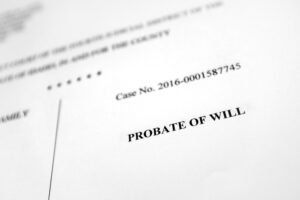How Does the New York Probate Process Work?
What happens to your property when you die? If you have a will, your estate may have to go through probate: the legal process for distributing your assets, disposing of your debts and carrying out your final instructions. In the state of New York, the probate process takes place in Surrogate’s Court, usually in the county you were last registered as living in at the time of your death.
A properly created will names an executor, a person whose job it is to make sure the wishes of the deceased as stated in the will are faithfully carried out. The executor’s first job is to file a probate petition, along with the will itself, in Surrogate’s Court. Notice must then be given to all potential heirs of the deceased, who have the right to come forward and challenge the will.
A will can be contested over how it was executed or whether the testator had the legal capacity to make it. In order for a will to be valid in the state of New York, the testator must have been at least 18 years old, of sound mind and not a victim of fraud, duress or undue influence. The will must have been signed by the testator in front of two witnesses who also signed in attestation.
If the will is not challenged successfully and the judge approves it, the executor will be assigned a number of responsibilities, which include:
- Making a list of all assets and getting them transferred to the estate
- Paying any bills, creditors and taxes on time
- Collecting any money owed
- Maintaining careful records of all estate transactions
- Distributing the remainder of the estate to named beneficiaries once all other debts are paid
Certain property may pass to beneficiaries outside the probate process, i.e. joint tenancies, life insurance benefits, retirement accounts and other assets that provide for automatic survivorship.
Probate can be avoided for an estate that includes personal property of $50,000 or less and/or real estate that is jointly owned with another person. If that is the case, the court will have a “small estate” proceeding. Known as voluntary administration, it is similar to probate. However, it goes through court much more expeditiously, requiring only an affidavit by the executor or other representative that lists all known relatives of the deceased and includes documentation of all known assets and debts.
The complexities of the probate process demonstrate the importance of having your will prepared by an experienced wills and probate attorney who can also serve as counsel to your executor after your death.
At the Law Office of Maurice J. Verrillo, P.C., we have over 30 years of experience in successfully helping people with legal issues. We are a family-focused, Christian law firm committed to advancing our clients’ best interests. To schedule a free consultation, call us at 585-563-1134 or contact us online.


